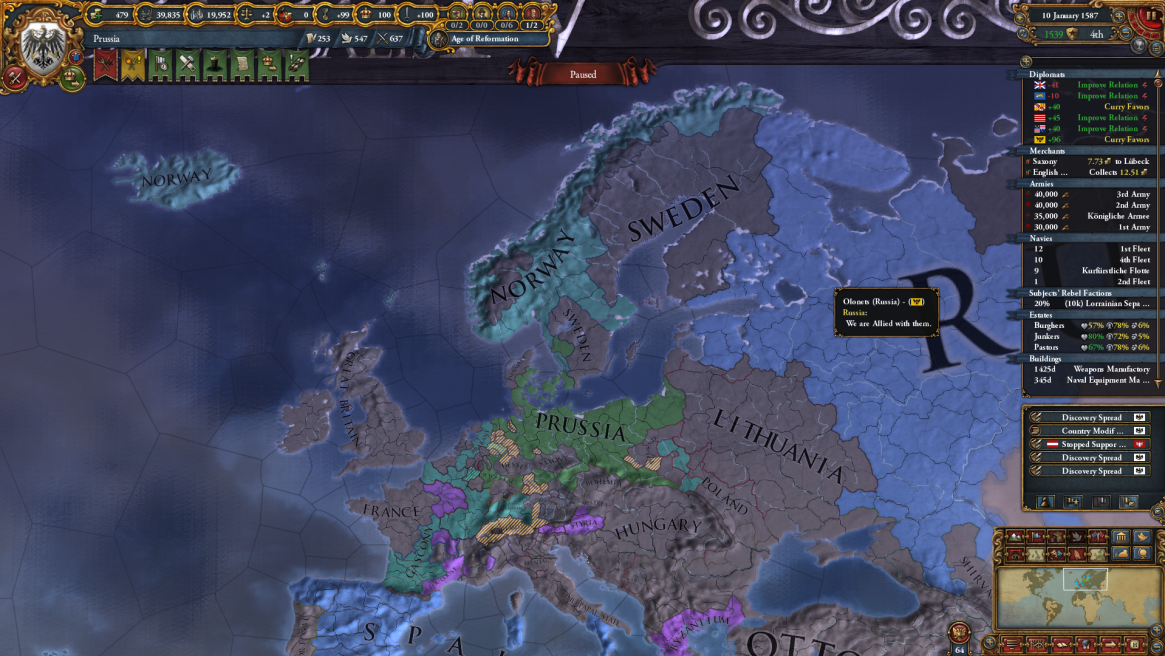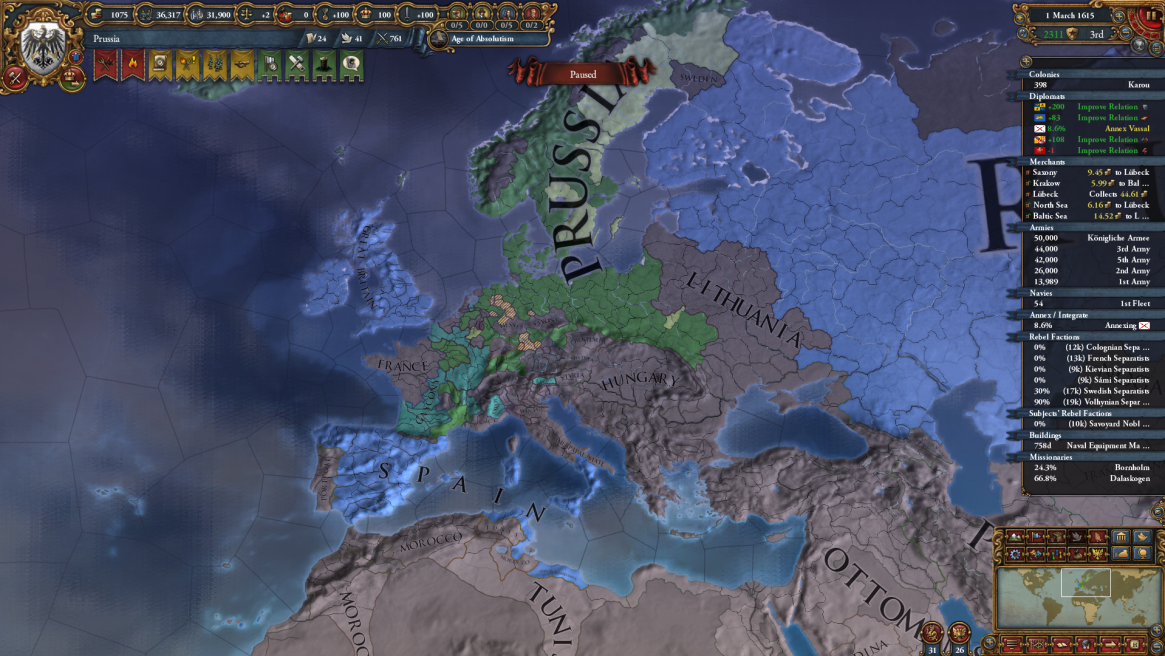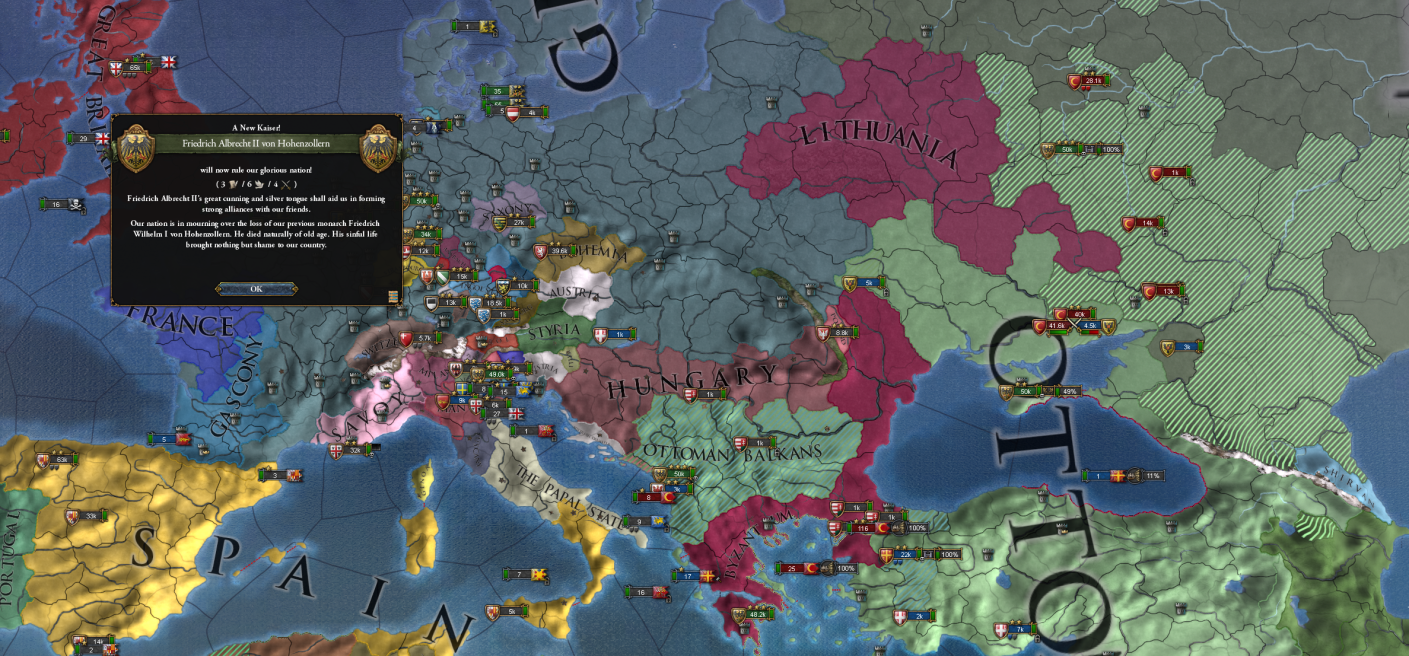This was a succession game done on Brandenburg we decided to call it and make a short aar if someone is intrested. If anyone would like to join a simular game in the future you can click the link down below. Pictures and potential in game discussions can also be found there.

 discord.gg
discord.gg
1444-1459 AAR:
The first ruler of brandenburg started off strong. Poland proved themselves an easy and powerful ally, along with the palatenate and colonge. Luneburg thought themselves our rival, so a quick show strength war gave lots of early monarch points. The tuetons allied or guarenteed our enemies to the north. Unfortunately for them, the tuetons allied denmark. Sweden declared probably the earliest independence war I have ever seen, allying muscovy, england, and scotland.
While this was going on, I attacked stettinfor a quick war=, taking a province and humiliating for some PP.
Muscovy proved an excellent enemy of our enemy, and occupied all of the tueton lands, leaving the northern enemy undefended. While attacking them, brunswick was taking forever to seige down, so lubeck also pounced, taking the war goal for themselves.
I took a province adjacent, and decided to punish lubeck. Lubeck's trade league was powerful, so I attacked wolgast, their ally. I force vassalized lubeck, taking care of our money problems.
Another opportunity quickly arose as poland declared on the tuetons. I had a claim on danzig from the stettin war, so I occupied that province in a seperate war and was able to vassalize them afterwards.
Unfortunately, the monarch of brandeburg died in the middle of another show strength war.
To his heir, he hopes he takes care of his short term goals: Returning cores from poland to the tuetons, and showing strength in the current war.
Brandenburg in 1459 on succession.
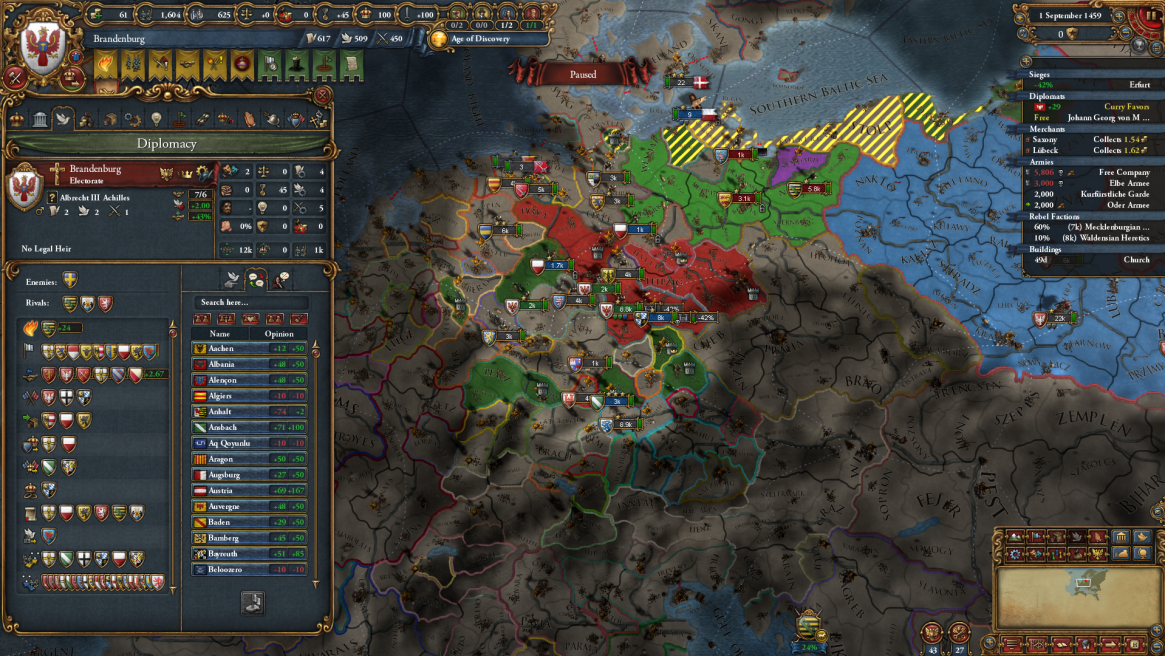
When Albrecht took the throne after his brother he inheirited potentially the third strongest realm in the holy roman empire only after Austria and Bohemia. He also inheirited a war that his brother had started that he intended to finish with haste. Albrecht was a diplomatic leader a that trait soon be the keystone of Brandenburgian foreign policy.
Soon after the war was finished a alliance with the emperor was formed which would secure Brandenburg from any further threats.
The hohenzollern lands outside of Branenburg would be cut off from the main family as they provided little value.
Although Albrecht preferred peaceful diplomacy he understood that to bring forth the true potential of his duchy Brandenburg would need to be the undisputed hedgemon in northern Germany, something that took both bloodshed and cunning.
In a little over a decade Brandenburg had crushed most potential rivals in it's viscinity and not soon after Albrecht would be elected holy roman emperor.
His first act as emperor would be to punish the danes who owned lands in the empire.
After his victory against the danes Albrecht used his last years to leverage his diplomatic hegemony in germany to make many smaller local states submit to him without a fight.
On his deathbed Holstein, Brunswick and Oldenburg all had become Brandenburgian vassals peacefully.
Brandenburg in the succession of 1489.
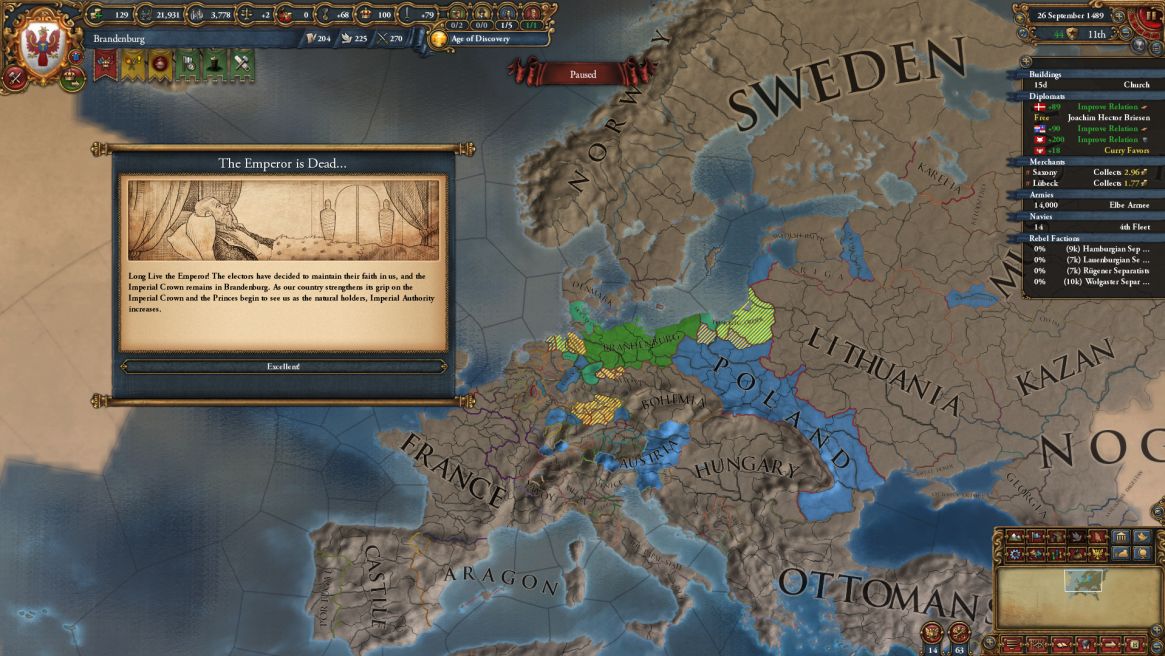
Friedrich III. took over in September 1489
He Builds up Army, and wages some wars Against some Minors, Stade and Halle are now Part of Brandenburg.
Conquest against Denmark, Sjalland is now Part of the Empire and Norway is a new Vassal.
He disolved that polish Alliance and conquered Ostrada.
In a Great war Friedrich took half of Bohemia.
In a defensive War together with Austria he lost his only war and has to accept a peace offer from France over 1k gold was paid to France.
In 1520 Friedrich converted to Protestant.
An internal Religios War waged till 1528.
1525 Prussia was formed and accepted as a kingdom in the HRE.
A Great Victory against Sweden was won, but this resulted in a Coalition against Friedrich.
When Friedrich died a Regency for his 3 year old Heir Albrecht was formed.
Prussia after it's third ruler.
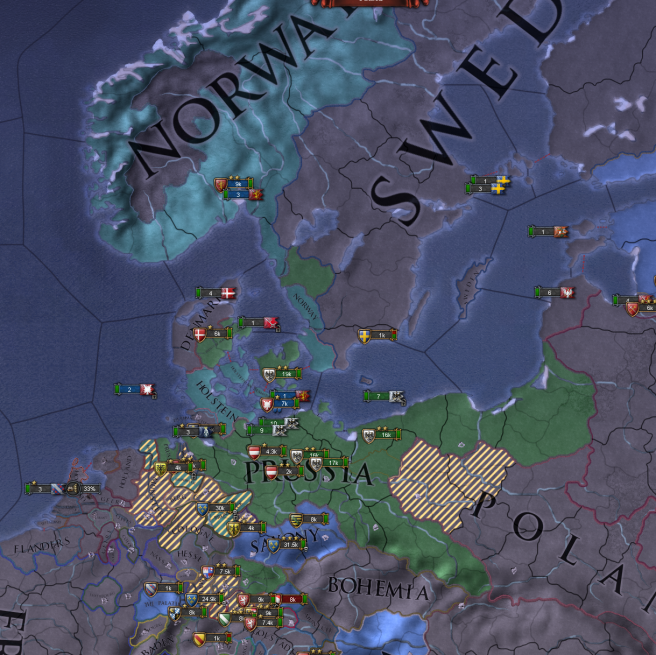

Discord - Group Chat That’s All Fun & Games
Discord is great for playing games and chilling with friends, or even building a worldwide community. Customize your own space to talk, play, and hang out.
1444-1459 AAR:
The first ruler of brandenburg started off strong. Poland proved themselves an easy and powerful ally, along with the palatenate and colonge. Luneburg thought themselves our rival, so a quick show strength war gave lots of early monarch points. The tuetons allied or guarenteed our enemies to the north. Unfortunately for them, the tuetons allied denmark. Sweden declared probably the earliest independence war I have ever seen, allying muscovy, england, and scotland.
While this was going on, I attacked stettinfor a quick war=, taking a province and humiliating for some PP.
Muscovy proved an excellent enemy of our enemy, and occupied all of the tueton lands, leaving the northern enemy undefended. While attacking them, brunswick was taking forever to seige down, so lubeck also pounced, taking the war goal for themselves.
I took a province adjacent, and decided to punish lubeck. Lubeck's trade league was powerful, so I attacked wolgast, their ally. I force vassalized lubeck, taking care of our money problems.
Another opportunity quickly arose as poland declared on the tuetons. I had a claim on danzig from the stettin war, so I occupied that province in a seperate war and was able to vassalize them afterwards.
Unfortunately, the monarch of brandeburg died in the middle of another show strength war.
To his heir, he hopes he takes care of his short term goals: Returning cores from poland to the tuetons, and showing strength in the current war.
Brandenburg in 1459 on succession.

When Albrecht took the throne after his brother he inheirited potentially the third strongest realm in the holy roman empire only after Austria and Bohemia. He also inheirited a war that his brother had started that he intended to finish with haste. Albrecht was a diplomatic leader a that trait soon be the keystone of Brandenburgian foreign policy.
Soon after the war was finished a alliance with the emperor was formed which would secure Brandenburg from any further threats.
The hohenzollern lands outside of Branenburg would be cut off from the main family as they provided little value.
Although Albrecht preferred peaceful diplomacy he understood that to bring forth the true potential of his duchy Brandenburg would need to be the undisputed hedgemon in northern Germany, something that took both bloodshed and cunning.
In a little over a decade Brandenburg had crushed most potential rivals in it's viscinity and not soon after Albrecht would be elected holy roman emperor.
His first act as emperor would be to punish the danes who owned lands in the empire.
After his victory against the danes Albrecht used his last years to leverage his diplomatic hegemony in germany to make many smaller local states submit to him without a fight.
On his deathbed Holstein, Brunswick and Oldenburg all had become Brandenburgian vassals peacefully.
Brandenburg in the succession of 1489.

Friedrich III. took over in September 1489
He Builds up Army, and wages some wars Against some Minors, Stade and Halle are now Part of Brandenburg.
Conquest against Denmark, Sjalland is now Part of the Empire and Norway is a new Vassal.
He disolved that polish Alliance and conquered Ostrada.
In a Great war Friedrich took half of Bohemia.
In a defensive War together with Austria he lost his only war and has to accept a peace offer from France over 1k gold was paid to France.
In 1520 Friedrich converted to Protestant.
An internal Religios War waged till 1528.
1525 Prussia was formed and accepted as a kingdom in the HRE.
A Great Victory against Sweden was won, but this resulted in a Coalition against Friedrich.
When Friedrich died a Regency for his 3 year old Heir Albrecht was formed.
Prussia after it's third ruler.



